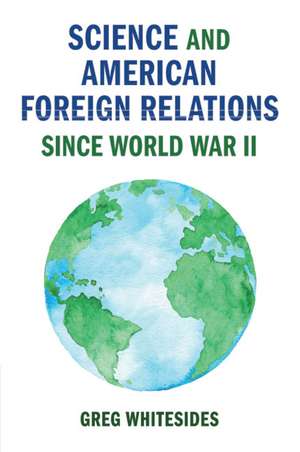Science and American Foreign Relations since World War II: Cambridge Studies in US Foreign Relations
Autor Greg Whitesidesen Limba Engleză Paperback – 27 mai 2020
Din seria Cambridge Studies in US Foreign Relations
-
 Preț: 226.35 lei
Preț: 226.35 lei - 11%
 Preț: 694.04 lei
Preț: 694.04 lei -
 Preț: 208.30 lei
Preț: 208.30 lei -
 Preț: 289.78 lei
Preț: 289.78 lei -
 Preț: 289.87 lei
Preț: 289.87 lei -
 Preț: 230.51 lei
Preț: 230.51 lei -
 Preț: 189.86 lei
Preț: 189.86 lei -
 Preț: 374.10 lei
Preț: 374.10 lei -
 Preț: 179.34 lei
Preț: 179.34 lei -
 Preț: 287.07 lei
Preț: 287.07 lei -
 Preț: 236.02 lei
Preț: 236.02 lei -
 Preț: 271.77 lei
Preț: 271.77 lei - 11%
 Preț: 536.64 lei
Preț: 536.64 lei -
 Preț: 325.16 lei
Preț: 325.16 lei -
 Preț: 227.49 lei
Preț: 227.49 lei -
 Preț: 289.95 lei
Preț: 289.95 lei -
 Preț: 226.17 lei
Preț: 226.17 lei -
 Preț: 181.93 lei
Preț: 181.93 lei -
 Preț: 179.53 lei
Preț: 179.53 lei -
 Preț: 211.94 lei
Preț: 211.94 lei -
 Preț: 413.07 lei
Preț: 413.07 lei -
 Preț: 406.71 lei
Preț: 406.71 lei -
 Preț: 372.00 lei
Preț: 372.00 lei -
 Preț: 405.35 lei
Preț: 405.35 lei
Preț: 321.90 lei
Nou
Puncte Express: 483
Preț estimativ în valută:
61.60€ • 65.87$ • 51.36£
61.60€ • 65.87$ • 51.36£
Carte tipărită la comandă
Livrare economică 18 aprilie-02 mai
Preluare comenzi: 021 569.72.76
Specificații
ISBN-13: 9781108409919
ISBN-10: 1108409911
Pagini: 352
Ilustrații: 3 b/w illus.
Dimensiuni: 153 x 230 x 22 mm
Greutate: 0.52 kg
Editura: Cambridge University Press
Colecția Cambridge University Press
Seria Cambridge Studies in US Foreign Relations
Locul publicării:New York, United States
ISBN-10: 1108409911
Pagini: 352
Ilustrații: 3 b/w illus.
Dimensiuni: 153 x 230 x 22 mm
Greutate: 0.52 kg
Editura: Cambridge University Press
Colecția Cambridge University Press
Seria Cambridge Studies in US Foreign Relations
Locul publicării:New York, United States
Cuprins
Introduction; 1. The battle of the laboratories; 2. Science contained; 3. The quiet war; 4. The crossing point; 5. Disorientation; 6. Globalization; 7. The fray; 8. The laboratory of diplomacy.
Recenzii
'In this intelligent and original book, Greg Whitesides brings needed attention to the role of science in post-1945 American diplomacy. Drawing on deep research in a range of sources, including scientific reports and publications, Whitesides shows with great clarity and skill how the United States leveraged its scientific and technical expertise to help other nations but also to advance the perceived needs of US foreign policy. Not infrequently these twin aims were in conflict, and the study illuminates the often mixed results of America's scientific dominance.' Fredrik Logevall, Harvard University, Massachusetts
'Whitesides has written an indispensable book on a topic long neglected: the role of science in American foreign policy from the World War II race to develop the atomic bomb to the Trump administration's rejection of international efforts to control climate change. Sources are almost encyclopedic in nature, ranging from scholarly monographs and articles to the 'Foreign Relations of the United States' series and declassified CIA documents. The story begins with a description of the importance of Allied collaborative research during the years 1940–45, followed by US use of technology as a Cold War weapon. Particularly fascinating are materials dealing with Soviet geneticist T. D. Lysenko, the crisis Sputnik created, the failed Alliance for Progress program in Latin America, US-Israeli scientific relations, and Chinese physicist and spy Wen Ho Lee. … works such as this revolutionize the writing of American diplomatic history. Highly recommended.' J. D. Doenecke, Choice
'Whitesides has written an indispensable book on a topic long neglected: the role of science in American foreign policy from the World War II race to develop the atomic bomb to the Trump administration's rejection of international efforts to control climate change. Sources are almost encyclopedic in nature, ranging from scholarly monographs and articles to the 'Foreign Relations of the United States' series and declassified CIA documents. The story begins with a description of the importance of Allied collaborative research during the years 1940–45, followed by US use of technology as a Cold War weapon. Particularly fascinating are materials dealing with Soviet geneticist T. D. Lysenko, the crisis Sputnik created, the failed Alliance for Progress program in Latin America, US-Israeli scientific relations, and Chinese physicist and spy Wen Ho Lee. … works such as this revolutionize the writing of American diplomatic history. Highly recommended.' J. D. Doenecke, Choice
Descriere
Chronicles the critical role the sciences have played in American foreign relations since World War II.
